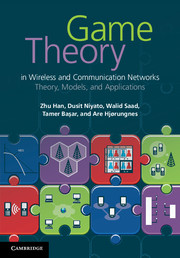1 - Introduction
Published online by Cambridge University Press: 25 October 2011
Summary
Brief introduction to the history of game theory
Game theory can be viewed as a branch of applied mathematics as well as of applied sciences. It has been used in the social sciences, most notably in economics, but has also penetrated into a variety of other disciplines such as political science, biology, computer science, philosophy, and, recently, wireless and communication networks. Even though game theory is a relatively young discipline, the ideas underlying it have appeared in various forms throughout history and in numerous sources, including the Bible, the Talmud, the works of Descartes and Sun Tzu, and the writings of Charles Darwin, and in the 1802 work Considérations sur la Théorie Mathématique du Jeu of André-Marie Ampère, who was influenced by the 1777 Essai d'Arithmétique Morale of Georges Louis Buffon. Nonetheless, the main basis of modern-day game theory can be considered an outgrowth of three seminal works:
Augustin Cournot's Mathematical Principles of the Theory of Wealth in 1838, which gives an intuitive explanation of what would, over a century later, be formalized as the celebrated Nash equilibrium solution to non-cooperative games. Furthermore, Cournot's work provides an evolutionary or dynamic notion of the idea of a “best response,” i.e., situations in which a player chooses the best action given the actions of other players, this being so for all players.
[…]
- Type
- Chapter
- Information
- Game Theory in Wireless and Communication NetworksTheory, Models, and Applications, pp. 1 - 13Publisher: Cambridge University PressPrint publication year: 2011



